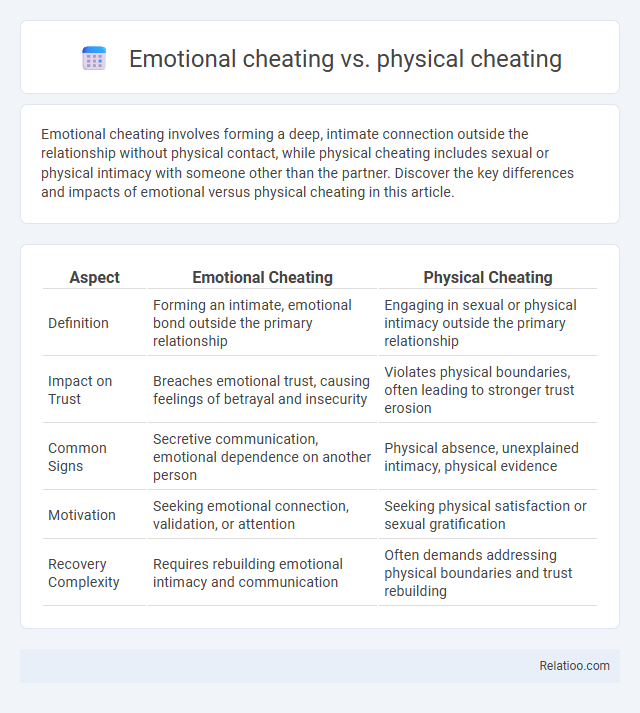Emotional cheating involves forming a deep, intimate connection outside the relationship without physical contact, while physical cheating includes sexual or physical intimacy with someone other than the partner. Discover the key differences and impacts of emotional versus physical cheating in this article.
Table of Comparison
| Aspect | Emotional Cheating | Physical Cheating |
|---|---|---|
| Definition | Forming an intimate, emotional bond outside the primary relationship | Engaging in sexual or physical intimacy outside the primary relationship |
| Impact on Trust | Breaches emotional trust, causing feelings of betrayal and insecurity | Violates physical boundaries, often leading to stronger trust erosion |
| Common Signs | Secretive communication, emotional dependence on another person | Physical absence, unexplained intimacy, physical evidence |
| Motivation | Seeking emotional connection, validation, or attention | Seeking physical satisfaction or sexual gratification |
| Recovery Complexity | Requires rebuilding emotional intimacy and communication | Often demands addressing physical boundaries and trust rebuilding |
Understanding Emotional Cheating
Emotional cheating involves forming deep, intimate connections with someone outside your primary relationship, often characterized by secretive conversations and emotional dependency, which can undermine trust and intimacy. Unlike physical cheating, which includes sexual contact, emotional cheating damages relationships through emotional betrayal, making it harder to detect and often more painful. Understanding emotional cheating helps you recognize boundary violations early, protecting your emotional well-being and preserving relational trust.
Defining Physical Cheating
Physical cheating involves engaging in intimate or sexual activities with someone outside your committed relationship, often characterized by physical contact such as kissing, touching, or sexual intercourse. Emotional cheating differs by forming deep, emotional bonds or romantic connections without physical interaction, which can still undermine trust and intimacy. Infidelity encompasses both physical and emotional cheating, representing any breach of loyalty or commitment that damages the foundation of your relationship.
Key Differences Between Emotional and Physical Cheating
Emotional cheating involves forming deep, intimate connections or sharing personal thoughts and feelings with someone outside your romantic relationship, which can undermine trust and emotional security. Physical cheating centers on sexual or physical intimacy with another person, directly impacting the physical exclusivity expected in most relationships. Understanding these key differences helps you recognize how each type of infidelity threatens your relationship in distinct yet damaging ways.
Emotional Cheating: Warning Signs
Emotional cheating involves forming a deep, intimate connection with someone outside your relationship that threatens your emotional bond with your partner. Warning signs include secrecy around communication, prioritizing another person's feelings over your partner's, and sharing personal thoughts or experiences that you typically reserve for your significant other. Recognizing these behaviors early can help you protect your relationship from the damaging effects of emotional infidelity.
How Physical Cheating Manifests
Physical cheating manifests through direct sexual activity or intimate physical contact with someone outside your committed relationship, such as kissing, touching, or sexual intercourse. This behavior often involves secrecy, breaking agreed-upon boundaries, and can cause significant trust issues and emotional pain. Recognizing physical cheating requires attention to changes in your partner's behavior, unexplained absences, or avoidance of intimacy with you.
Emotional Cheating and Digital Communication
Emotional cheating involves forming a deep, intimate connection with someone outside your primary relationship, often through digital communication channels such as texting, social media, and private messaging apps. This form of betrayal can be just as damaging as physical cheating because it undermines trust and emotional intimacy with your partner. Understanding the nuances between emotional and physical cheating helps you recognize boundary violations and protect your relationship from infidelity in all its forms.
Psychological Impact on Partners
Emotional cheating often destabilizes Your sense of trust by creating intimate bonds outside the primary relationship, leading to feelings of insecurity and emotional neglect. Physical cheating typically triggers intense psychological pain, including betrayal trauma and lowered self-esteem, due to the breach of sexual exclusivity. Infidelity, encompassing both emotional and physical acts, profoundly impacts partners' mental health, causing anxiety, depression, and challenges in rebuilding trust and emotional safety.
Rebuilding Trust After Cheating
Rebuilding trust after emotional cheating, physical cheating, or infidelity requires consistent honesty, transparent communication, and patience to heal the emotional wounds involved. Emotional cheating often damages intimacy deeply by creating secret emotional bonds, whereas physical cheating typically breaks trust through breaches of physical boundaries, both requiring tailored approaches in counseling or therapy. Your commitment to understanding and addressing the root causes can facilitate recovery and restore a foundation of trust in the relationship.
Preventing Both Emotional and Physical Infidelity
Preventing both emotional and physical infidelity requires clear communication, trust-building, and setting mutual boundaries within your relationship. Establishing open dialogue about feelings and expectations helps identify vulnerabilities before they lead to emotional or physical cheating. Strengthening your emotional connection reduces the risk of infidelity by fostering intimacy and commitment.
Seeking Help: Therapy and Relationship Counseling
Emotional cheating, physical cheating, and infidelity each impact relationships differently but often cause significant trust issues and emotional pain. Seeking help through therapy and relationship counseling can provide your partner and you with effective communication tools, conflict resolution strategies, and ways to rebuild trust and intimacy. Professional guidance addresses underlying issues and fosters healing, increasing the chances of restoring the relationship's strength and stability.

Infographic: Emotional cheating vs Physical cheating
 relatioo.com
relatioo.com